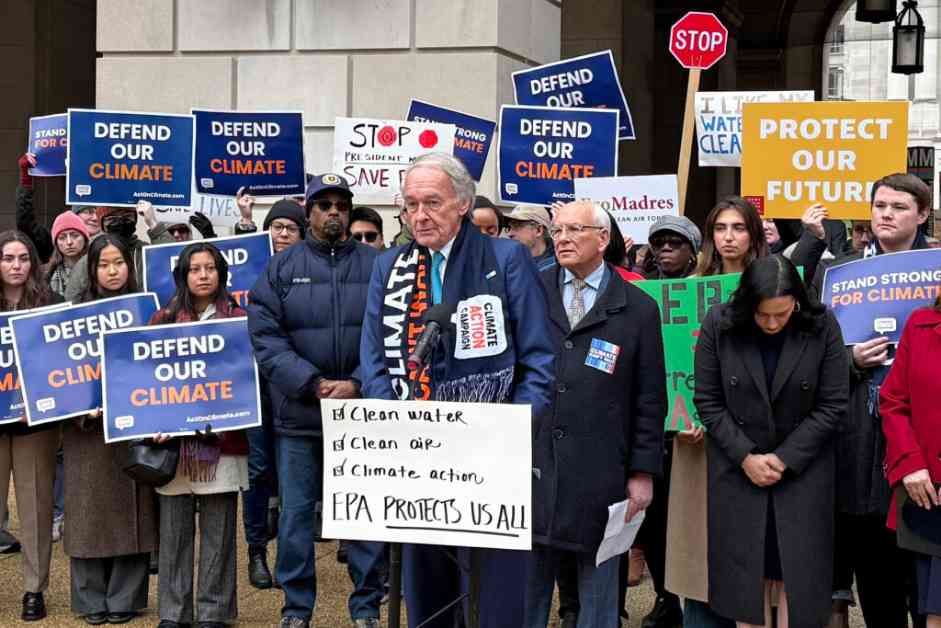A group of legislators, led by Sen. Ed Markey (D-Mass.), recently made headlines as they sought accountability from the U.S. Environmental Protection Agency (EPA). Dressed in a blue suit with a scarf boldly declaring “Climate Can’t Wait,” Senator Markey and his colleagues, Rep. Paul Tonko (D-N.Y.) and Rep. Yassamin Ansari (D-Ariz.), entered the EPA headquarters only to be met with an unwelcoming response from security personnel. Despite the initial resistance, the lawmakers persisted and demanded a meeting with EPA officials, stressing the importance of discussing the fate of critical environmental programs that impact the lives of Americans across the nation.
Challenging the Status Quo
As they braved the rainy weather outside the EPA headquarters, the legislators and a group of environmental advocates gathered to express their concerns about the alleged interference of Elon Musk and his team in the agency’s operations. They accused Musk, an influential campaign donor and ally of former President Trump, of prioritizing corporate interests over environmental protections. Additionally, the newly appointed EPA leadership was criticized for failing to uphold federal court orders and safeguarding essential environmental safeguards.
The lawmakers emphasized the urgency of the situation, particularly in regions like Phoenix, Arizona, where extreme heat and air pollution pose significant health risks to the population. Rep. Ansari underscored the direct impact of EPA policies on people’s lives, highlighting the need for transparency and adherence to legal mandates. Despite legal challenges and public outcry, concerns persisted regarding the freeze on federal funding and its repercussions on ongoing projects and environmental initiatives.
Standing Up for Accountability
During a press conference outside the agency headquarters, Senator Markey and his colleagues reiterated their commitment to holding the EPA accountable and preserving its core mission of environmental protection. They raised concerns about the reported dismantling of environmental programs in favor of tax breaks for the wealthy, signaling a broader conservative agenda that prioritizes financial gains over public welfare. The legislators also drew attention to the alleged intimidation of EPA employees and the potential loss of critical environmental justice initiatives.
Matthew Tejada, a former EPA official, shared insights into the challenges faced by agency staff under the current administration, emphasizing the atmosphere of fear and uncertainty surrounding their work. Despite the obstacles, the lawmakers vowed to pursue congressional investigations and legal actions to address the EPA’s alleged violations and push back against the erosion of environmental safeguards.
In the face of mounting resistance and political hurdles, the legislators recognized the need for public mobilization to counter the unlawful dismantling of environmental protections. They called on Americans to raise their voices against the exploitation of natural resources and environmental injustice perpetuated by powerful interests. By advocating for clean air, clean water, and a sustainable future, Senator Markey and his colleagues underscored the importance of collective action in safeguarding the planet for future generations.
The legislators’ unwavering commitment to environmental accountability and public welfare echoes a broader sentiment of urgency and responsibility in the face of escalating environmental challenges. As they navigate the complex landscape of environmental policy and corporate influence, these lawmakers embody the spirit of civic engagement and advocacy for a healthier, more sustainable world. Their efforts serve as a reminder that the fight for environmental justice is far from over, requiring continued vigilance, resilience, and solidarity among all stakeholders.
The narrative of the legislators’ visit to the EPA headquarters encapsulates a larger narrative of political activism, environmental stewardship, and social responsibility in the pursuit of a greener, more equitable future. By shining a light on the critical issues at stake and demanding transparency and accountability from government agencies, these lawmakers exemplify the power of civic engagement and advocacy in shaping policies that impact the well-being of communities nationwide.














